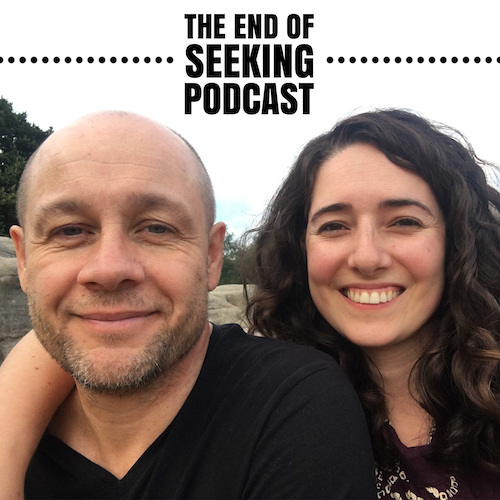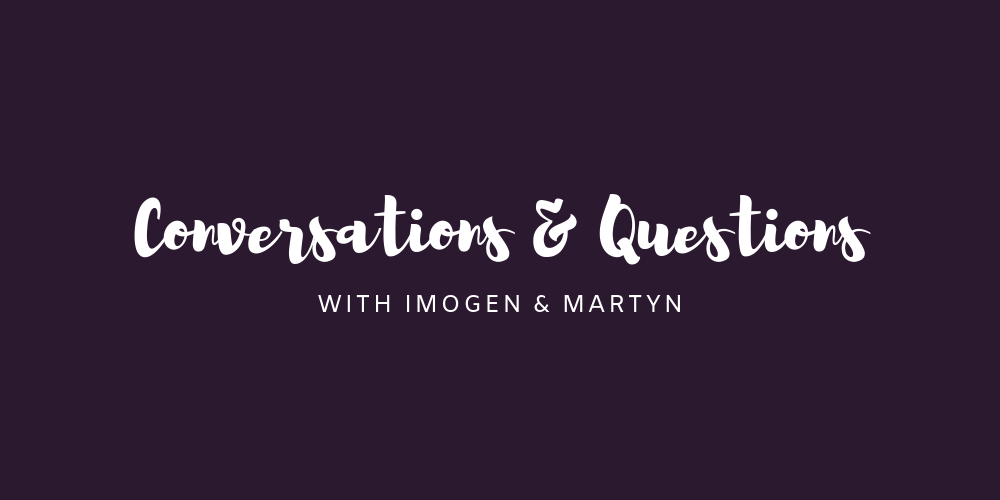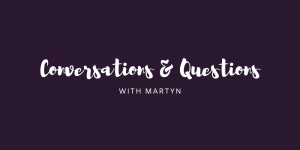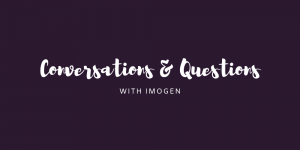Transcription from a conversation between Imogen & Martyn on 26th May 2019 on modeling behaviour, the difference between prescription & description in light of non-doership, as well as decision making.
—
Martyn
… We talked about the awakened beings being catalysts for awakening in others just simply by virtue of them being authentically what they are, then that has a powerful effect, a resonant effect and becomes a catalyst for other people around them, energetically and on all sorts of levels.
Imogen
Yeah, but I think the equal is true, and that’s the thing, it’s not just about awakened beings, it’s about everyone, all types of people. They model, they mirror to someone else what is possible, what is necessary, or whatever the words you want to use.
But it spreads. You know, like when a smile spreads. Someone smiles and everyone else smiles, and so to be accountable to yourself about what you want other people to treat you like. It’s like that golden rule of treat others as you would treat yourself, but we also have a lot of damaged, traumatised or sick people who are who are treating themselves terribly and so it’s no surprise that you see this in culture broadly too.
Martyn
Yes, the Golden Rule doesn’t work in that case.
Imogen
Well, no, but I think it does. But the opposite is also true. You treat others how you treat yourself and if you’re treating yourself like shit, you’re likely to treat others shit too. And so I guess what I’m saying is the more people that can be aware of the power of that, and actually model their behaviour on how they how they do want to be treated, in themselves and others, the better.
Martyn
Yeah, you speak to that. The modelling bit of it is that when you do treat yourself well, people can see that, and therefore give themselves permission to do the same as they have an example of what it looks like to do that.
Imogen
I mean, what’s that saying, “If you can’t love yourself, how in the hell you gonna love somebody else?”
Martyn
I mean, I’ve noticed in myself in the past, where the things I’m intolerant of in people, and this is classic Jungian or psychological stuff, the stuff that you’re intolerant in other people is the stuff you don’t tolerate within yourself. And it just brought around the Gandhi thing, “be the change you want to see in the world” but he maybe could’ve expanded on why that is – because you become a model for that.
Imogen
A model and a mirror.
Martyn
You’re modelling what that looks like in the world.
Imogen
And what’s possible.
Martyn
Yes, exactly, exactly. That’s why we see people saying things like Misty Copeland, saying, “There was no one like me, and so now I see all these black ballerinas aspiring to the highest in their field.” Because she’s shown what was possible, she’s modelling what was possible. And I think that’s a really important movement. But I think most of all, authenticity, self awareness and vulnerability, if you can model these kinds of foundational ways of being in the world, that’s going to change everything.
Imogen
No matter how much it’s going to maybe hurt and scare you to do that. Because you might be surrounded by not that to start with, or surrounded by people who don’t know how to respond or take that.
Martyn
It’s in spite of that.
Imogen
Exactly. It’s in spite of that. And in spite of that there is still the possibility of encouraging others to move into that as well. And it does come with time.
Martyn
Jordan Peterson points out something, he talked about the ethics of how to properly deal with a world that you’re born into that you find to be filled with tragedy and malevolence. So inherently tragedies are going to occur. And on top of that people are going to behave really badly to add malevolence to it.
So the conclusion you could come to is, “what’s the point?” Nihilism, where it’s not worth it, the suffering isn’t worth it. And he talks about maybe it’s something like the Christian ethic is, in the highest sense, as a modelling of a certain way being is that, despite the malevolence and the tragedy of life, you choose to endeavour to make it a better place and improve yourself and the world. To treat it as ultimately benevolent, despite all the knocks. And in coming to that attitude, it’s nothing about the world in itself, but the difference is if you come at it with that attitude, then you do in fact make it benevolent in spite of all the malevolence.
Whereas if you choose the nihilistic view, “oh, it’s not worth it”, in doing that, you take the pathway to hell, and you’re adding to the tragedy in the malevolence of the world. So really, it’s modelling that kind of realistic authenticity, that says, “yeah, I know, the world is full of suffering, but even so I can contend with that, be authentic in my truth.” And so trust that actually being in your own authenticity is the kind of antidote to all the ill really. So it’s not about not having the bad stuff. In some sense, the transmutation of the bad stuff, it becomes the mud for the lotus. It becomes the fuel for the blooming of good things. Because that kind of pushback can make you stronger, making you more wise.
Imogen
Well, and also to be free of it. Like when you when you resist against, say “bad stuff”. When you resist this bad stuff, you’re actually putting more energy into it, you’re actually not free from it, you’ve got a wall against it, and you’re pushing as hard as you can. When you actually let that stuff in, you’re free from it, because it comes in and and then out of you. It’s like you become air or space. And you know, the air that we breathe, it’s free, it’s just moves, you don’t have a box that you cut off, you open a window, there’s no difference between no air outside and the air inside, it’s just air.
And so to be free of these things is that, is to not have any boundaries and walls against any of that, it’s to include all of it, and then it’s to be free. So if you can model what that means, it means that no one’s avoiding anything anymore. So in that way you’re not affected by it. It’s not that you don’t feel it, it’s that you’ve not got the the energy of boundaries railing against it.
Martyn
Which is what causes you trouble in the end. I mean it’s interesting, the deepest truth is that it is actually going its own way and so resistance to it is futile. And that kind of goes in the face of many of the self-empowering type of philosophical positions or ideological views.
Imogen
Well, so here’s how I look at it, it’s the description-prescription thing. So what we were talking about, “be the change you want to see”, that’s very prescription led. But actually, if you could see that it’s actually a description of what happens when you become awake to these dynamics naturally occuring in yourself. That’s what you started this discussion with, awakened beings modelling behaviour. Modelling openness, vulnerability, authenticity, non-resistance, spontaneity, these sorts of things. It’s not a prescription that we’re talking about, it’s a description, even though it sounds like a prescription.
Martyn
I love that though. That’s exactly what I was thinking about when we were talking the other day, all these different sophisticated spiritual teachings going on, and most of it I’ve had to sort of throw out, because of so much embellishment and unnecessary perspectives. But through observing in myself, in you and in others, just observing and really distilling the essence of broadly nondual teachings or spiritual teachings, is that there’s this shift between duality, or rather the dualistic view, and the nondual view. And it shifts, there’s a transition point where one collapses, and the other is revealed to be always the underlying truth.
Imogen
And yet still the same language, the same descriptors are used.
Martyn
Right. And so that’s just what you’re talking about. It’s where prescription turns into description.
Imogen
Yes, where the words are the same but the meaning, understanding or intention behind the words is very different, it’s see that it’s a description versus a prescription.
Martyn
Well prescription is viewed through the lens of personhood.
Imogen
Exactly.
Martyn
The lens of personhood is fundamentally dualistic, so once you transcend the person and then you see the word or concept to have a different meaning.
Imogen
Yes, the descriptor is said in the same way, but is seen as a prescription from the perspective of personhood, but from the perspective of someone who has transcended this they see it to be a description. For example the word “stop” – it’s the same word, and yet to the ‘person’ they would hear “I need to stop” instead of seeing, “oh, stopping is happening’. So it’s the same word but it’s heard in a different light.
Martyn
Yeah, exactly. Maharishi used to say knowledge is different in different states of consciousness. So if you’re abiding in this dualistic view you’d hear, “abide in peace, abide as truth” as something to do.
Imogen
Yes you’re gonna hear it as a prescription.
Martyn
Yeah, exactly. Versus seeing “abide in peace” as an exposition of what’s arising.
Imogen
And so this is also true when talking about the idea of modelling behaviour. It doesn’t matter if you’re focused on the best or worst of human behaviour, it’s still a description not a prescription. For example, when we’re talking about people who are struggling with the difficult spectrum of human life, they hate themselves, they have no self-worth, that’s what they’re also modelling out to everyone else. Again, if you’re in a duality kind of perspective, you will see that as, “oh they’re bad people, and they’re doing bad, they need to change.” But from the nondual perspective, that’s also just what’s happening, it’s just that’s what’s being supported in the world in that moment is that type of action.
Martyn
You know what’s really difficult is currently right now you see the political, social, political forces that are like, “we MUST do something!”, and if you don’t do something you’re shirking in your personal responsibility.
And there’s a real, tight assertion, a grasping of that idea that, “we need to take action”, which may well be true on its own level, right? Not saying it’s not. But right now, with the fervour of that kind of urgency, where people are going, “our world is on fire, and Trump’s there, and fascists everywhere”, and all this kind of stuff, and you’ve got to stand up and resist. From a spiritual point of view, from this perspective, it’s like yes and no, because it’s all actually just happening exactly the way it should, the world is exactly how it should be. Even at the same time as actions happen and interventions get made and all that.
Imogen
And that’s also what’s meant to be happening.
Martyn
So it’s very hard. I guess what I’ve been kind of interested in and my attention’s been drawn to is the kind of the popular culture and the nature of political and social culture right now. I see that people are taking sides on a lot of issues and demanding action be taken a lot of issues. And so, whereas my message and the message of the spiritual is, actually you need to surrender, surrender your own sense of volition, and surrender your resistance to what is. So on that social political level, that message seems massively irresponsible, and just simply doesn’t concede to that.
Imogen
Well if you take that spiritual message of surrender in that way it suggests there’s nothing to be done. And that’s not totally true either.
Martyn
No, because doing happens. And arguably the irony of it is, when surrender does come about and the person-view dissolves, and the recognition of the universal, non-dual self view comes about, then spontaneous right action happens in accord with all the natural necessities.
Imogen
I was speaking to someone yesterday and they were like, “Well, how do I make decisions? I see all these possibilities, how do I make a decision?” And my answer to this, when you get quiet, when you stay present, not in the past, not in the future, right now. When you get quiet the right answer and the right feeling (more importantly) comes up. You get a sense of this is the right thing, or this is the wrong thing, you always know it. And often it appears so quiet that you miss it, so you have to get as quiet as is required for the right thing to be heard. It’s always there, and it’s always in the present, it’s never in the past, it’s never in the future, it’s always right now, and it’s always felt. And you know when something’s right, everyone knows that experience of when something feels right.
Martyn
Yes it’s quiet, it’s not some loud, tense, aggravated, resistant place, full of noise in the moment.
Imogen
And it doesn’t come from fear, and it doesn’t come from thinking about the past, and what should happen. It doesn’t come from, “oh, well, if I do this, I do that in the future, this will happen, that will happen”. It always is right now, there’s a sense, a feeling of, “this is correct”. And we miss it all the time. Because internally it’s so noisy about the future and the past, all of our thoughts, and all of our attention is towards those places and so we miss the present moment decision-making. People ask how to make decisions. Decisions are right here. They’re not in the future and they’re not in the past. They’re right here. So how can you expect the correct decision, and to be able to listen to the correct decision if you’re constantly being in the future or the past?
Martyn
Yeah, it’s like taking recourse to that level of your own awareness-intelligence, is taking recourse to the deeper, wider, more connected sense of intelligence. It’s the whole, it’s not just some kind of thought that just comes to mind and a muddle of things that you receive here and there with no real connection to your own felt experience, or that deeper level of our own intelligence. That embodied level of intelligence. I think that’s the shift, out out of mind and into embodied intelligence, we are like a node of the universal intelligence connected to the boundless intelligence, if you want to look at it in those terms.
Yeah, I think you’re absolutely right, quieting down in the moment. But that kind of kicks back into the sense of this idea about authority and knowing right and wrong, true and false. And so much of our society is predicated on that those ideas of true false, right, wrong, morally right and wrong, and politically right and wrong. They’re handed down.
Imogen
Yeah, they’re disconnected from the actual experience of it.
Martyn
We don’t trust ourselves to intuitively, deeply, know what’s right, what’s wrong, what’s correct.
If you have a question you’d like to ask Martyn or Imogen please get in touch via email, social media or even post your question in the comments below. If your question and/or our response could be helpful to others we may post them in another ‘conversations & questions’ post (don’t worry, all info connecting to you personally would be removed!).



